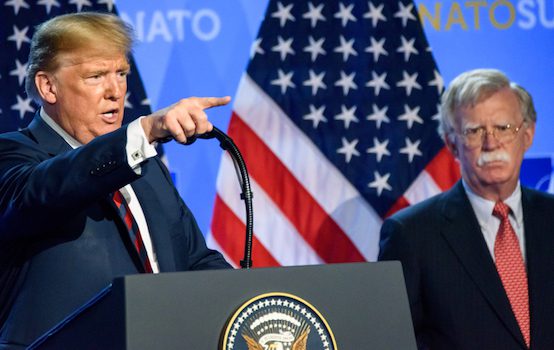Reminder: Trump, Not Bolton, is the President

Unsatisfied with the direction of U.S. foreign policy? You’re not alone. The Washington Post describes a “frustrated” Donald Trump who feels he has been “misled” about how easy it would be to oust Nicolás Maduro in Venezuela.
“The president’s dissatisfaction has crystallized around national security adviser John Bolton and what Trump has groused is an interventionist stance at odds with his view that the United States should stay out of foreign quagmires,” the Post reported on May 8.
Channeling pop star Carly Rae Jepsen, Trump may be beginning to recognize that his administration’s stance toward Iran is crazy and that Tehran should call him, maybe. “What they should be doing is calling me up, sitting down; we can make a deal, a fair deal. …We’re not looking to hurt Iran,” Trump told reporters at the White House. “I want them to be strong and great and have a great economy. But they should call, and if they do, we’re open to talk to them.”
Trump dismissed a New York Times report that the White House was reviewing a plan to send 120,000 troops to the Middle East—”military plans against Iran, in echoes of Iraq war”—as “fake news.”
“It used to be that the staff around the president were the counterweight to some of his more aggressive impulses. Now it seems as if the situation has reversed itself,” former Trump official Fernando Cutz told the Washington Examiner. “The president is the counterweight to some of his more hawkish staff members, particularly Bolton.”
Trump has said as much himself. “I actually temper John,” he recently advised reporters. “I have John Bolton and I have other people that are a little more dovish than him and ultimately I make the decision.”
Who are these doves? And when will the president of the United States make a decision that overrides a rogue national security team ideologically committed to policies that are nearly the opposite the ones he campaigned on in 2016? Those are the fateful questions that could determine the course of a presidency—and the country.
For even on Iran, long an unprincipled exception to Trump’s “America First” skepticism of regime change in the Middle East, there have been signals that the president is reluctant to do Iraq 2.0. “We are not going to war in Iran,” said White House chief of staff Mick Mulvaney. Secretary of State Mike Pompeo told a group of Iranian-American community leaders that the administration wasn’t contemplating military intervention, asserting, per Axios, “We’re careful not to use the language of regime change.” Pompeo also sought to distance the White House from Bolton’s and Rudy Giuliani’s dalliances with Iranian resistance groups.
But things certainly seem to be moving in a more warlike direction and Trump’s personnel choices seem a poor fit for his stated policy preferences. When something similar happened under Ronald Reagan, conservative admirers of the president exhorted his aides to “Let Reagan be Reagan.” The columnist Joe Sobran eventually quipped, “Let someone else be Reagan.”
“Let Trump be Trump” is a battle cry of the 45th president’s populist admirers. (It’s also the title of a book by Trump campaign veterans Corey Lewandowski and David Bossie.) The columnist Ann Coulter is probably ready to say, if she hasn’t already, “Let someone else be Trump.”
There are two key differences here, however. First, Reagan was himself when he ignored his more hawkish advisers and boosters at the tail end of the Cold War. On many critical foreign policy decisions, he was right and they were wrong.
Second, this president is already letting someone else be Trump—Bolton on foreign policy and Jared Kushner on immigration. The results are different than what his supporters voted for and could be disastrous for the republic.
Either way, the buck does ultimately stop with the president, as Harry Truman said. Trump could have allowed Congress to reassert its constitutional war powers. Instead he vetoed the Yemen resolution, arguably the greatest bipartisan antiwar legislative triumph in a generation.
It is understandable that some George W. Bush retreads would make it into the next Republican administration. It is inexplicable that Never Trump neocon Elliot Abrams has been pulled from retirement to oversee Venezuela policy.
Trump has sought to end two wars—Afghanistan and Syria—without starting a major new one, unlike his two immediate predecessors. If he does not soon remind Bolton and company who is in charge instead of acting like an innocent bystander in his own White House, his foreign policy legacy will be very different—and the American people will likely let someone else be commander-in-chief.
W. James Antle III is editor of The American Conservative.
Comments